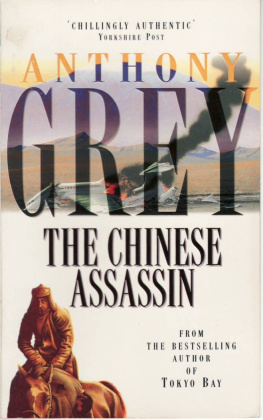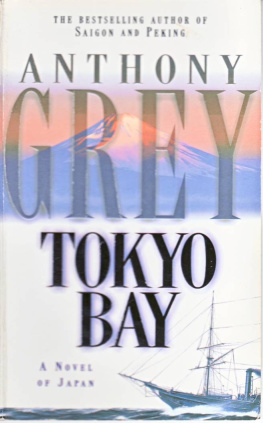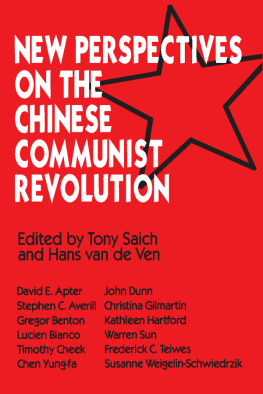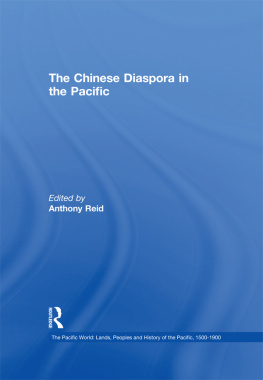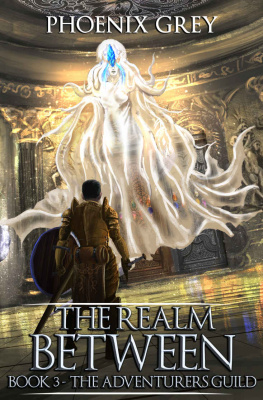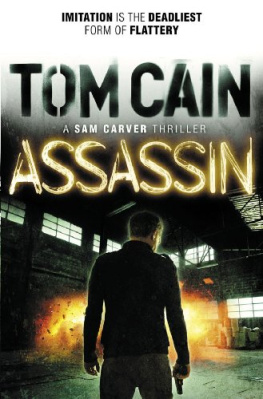Anthony Grey - The Chinese Assassin
Here you can read online Anthony Grey - The Chinese Assassin full text of the book (entire story) in english for free. Download pdf and epub, get meaning, cover and reviews about this ebook. genre: Detective and thriller. Description of the work, (preface) as well as reviews are available. Best literature library LitArk.com created for fans of good reading and offers a wide selection of genres:
Romance novel
Science fiction
Adventure
Detective
Science
History
Home and family
Prose
Art
Politics
Computer
Non-fiction
Religion
Business
Children
Humor
Choose a favorite category and find really read worthwhile books. Enjoy immersion in the world of imagination, feel the emotions of the characters or learn something new for yourself, make an fascinating discovery.
- Book:The Chinese Assassin
- Author:
- Genre:
- Rating:5 / 5
- Favourites:Add to favourites
- Your mark:
- 100
- 1
- 2
- 3
- 4
- 5
The Chinese Assassin: summary, description and annotation
We offer to read an annotation, description, summary or preface (depends on what the author of the book "The Chinese Assassin" wrote himself). If you haven't found the necessary information about the book — write in the comments, we will try to find it.
The Chinese Assassin — read online for free the complete book (whole text) full work
Below is the text of the book, divided by pages. System saving the place of the last page read, allows you to conveniently read the book "The Chinese Assassin" online for free, without having to search again every time where you left off. Put a bookmark, and you can go to the page where you finished reading at any time.
Font size:
Interval:
Bookmark:

When a Triden t airliner crashes in Mongolia, the Chinese government keeps suspiciously quiet about who and what was onboard. Yet a y e ar later they claim that one of the nine charred victims was Lin Piao, C hinas Defence Minister, fleeing to Russia after an abortive attempt t o assassinate Mao Tse-tung and seize power.
Five years pass and a Chinese defector named Yang suddenly appears, claiming to be a survivor of the air disaster and produces some astonishing new evidence.
How did Lin Piao really die was it an accident or was he murdered? Who is Yang? And what is the truth behind one of the most mysterious plane crashes in modern times?
As the secret services of Russia, China, America and Britain clash in their attempts to seize Yang, the most destructive earthquake since the fifteenth century rocks China and the dying Mao comes face to face with a deadly assassin.
Anthony Greys books and short stories have been translated into some fifteen languages worldwide. His enduring epics Saigon and Peking are critically acclaimed bestsellers in Europe, the Far East, South Africa, Australasia and the Americas. A former foreign correspondent with Reuters in Eastern Europe and China, he has written eight novels to date. His first book was an autobiographical account of the two years that he was held hostage by Red Guards during Chinas Cultural Revolution. His most recent novel, Tokyo Bay, is the fi rst volume of a trilogy illuminating one hundred and fifty years of tortured rivalry between Japan and the West.
Anthony Grey makes documentary films for British television, broadcasts internationally on the BBC World Service, and lives at present in London.
Also by Anthony Grey
Autobiography
HOSTAGE IN PEKING
Short Stories
A MAN ALONE
Non-Fiction
THE PRIME MINISTER WAS A SPY
Novels
THE GERMAN STRATAGEM
THE BULGARIAN EXCLUSIVE
SAIGON
PEKING
THE BANGKOK SECRET
THE NAKED ANGELS
TOKYO BAY
ANT H ONY GREY
T H E
CHINESE
ASSASSIN
PAN BOOKS
First published 1978 by Michael Joseph
This edition published 1985 by Pan Books
an imp rint of Macmillan Publishers Ltd
Eccles t on Place, London SW1W 9NP
and Basingstok e
Associated companies throughout the world
ISBN 0 330 28636 6
Copyright C Anthony Grey Productions Ltd 1978
All rights reserved. No part of this publication may be
reproduced, stored in or introduced into a retrieval system, or
trans m itted , in any fo rm , or by any means (electronic, mechanical,
photocopying, recording or otherwise) without the prior written
permission of the publisher. Any pe rs on who does any unauthorized
act in relation so this publication may b e liable to criminal
prosecution and civil claims for damages.
A CIP catalogue record for this hook is available from
the British Library
Phototypese t by Intype London Ltd
Printed and bound in Great Britain
by Macka y s of Chatham PLC, Chatham, Kent
This hook is sold su b ject m the condition that it shall nor,
by way of trade or otherwise, he lent, re-sold, hired nut,
or othe rw ise circulated without the publishers prior consent
in an y fo rm of binding or cover other than that in which
it is published and without a similar condition including this
condition being imposed on the su bsequen t purchaser.
For Clarissa Jane and Shirley
the inspiration and the reward
First in China comes Mao Tse-tung.
Then comes Mao Tse-tung again.
Next comes Mao Tse-tung once more.
Then there is a lot of nothing.
And th en, and on l y th e n come a l l the others
with Li n Piao leading the procession.
Peking colloquialism 1970
PART ONE
A train of fifty camels was passing that night, black shapes swaying through the wind, darker than the distant mountains. The pale northern light that glimmers all through the sleeping hours in summer and early autumn on those steppes was already brightening the bottom of the sky across the Soviet border to the north.
Old Tsereng Toktokho, wrapped against the cold lash of the night wind in his peaked hat of fur and the heavy sheepskin coat that was almost as old as he was, sat astride his restless horse watching the camels go. His eyes never scanned his herds directly as they shifted around him. His gaze, even in darkness, seemed always to sweep the deep distances of the harsh and endless tundra that he loved. His face was like the saddle on which he sat, creased and tanned almost black by years of merciless beating from wind and sun. But though old, he was stubborn and still brave. Thats how he came to be among the last arats in Mongolia living outside the communal co-operatives. And thats how he came to save my life.
He had just tipped a long draught of kumiss into his great throat from the leather bottle that always hung at his belt, when he heard the first sound of our Trident far away down the sky to the south. There was nothing like kumiss for keeping out the chill Mongolian wind, he told me many times in the months he hid me and sheltered me from death. But although I helped him with the milking of the mares in June and drank it to please him, I never learned to love kumiss like old Tsereng. Although it resembled strong beer , it was too fizzy for me. It had a sour caste that reminded me of burned almonds and to my nostrils it always reeked unpleasantly of the stables.
His horse had picked up the unfamiliar sound of the jet engines first. It was the twitching of the animals ears and his sudden stamping that alerted the old man. Immediately he loosened the ear flaps of his fur hat to hear better. I know all this because he told me every detail a thousand times during the long winter nigh t as we lay on the pile d furs in hi s yurt warmed by the pungent breath and body heat of the sheep, goats and yaks crowded in all around us, some pregnant, some already with their bleating young. I always concentrated on every word he said, even when Id heard it all before. I had to, to prevent my eyes wandering to the stocky bodies of his wife and daughter, who invariably threw off all their clothes and sprawled naked on their furs among the animals in the stifling heat. Only when the wind really howled through the seams in the felt walls did they wrap themselves in their fur coats for the night.
The Trident had been specially equipped with military radar when it was in service with the Pakistan Air Force and that enabled us to fly at a very low level under the Soviet detection scanners. We roared over the Kerulen River, flying at little more than two hundred f e et, heading north-west. The border of our beloved Peoples Republic of China was 400 miles behind us and we had crossed it just before two oclock in the morning, at an even lower altitude.
It was almost three oclock when Toktokho detected the first sounds of our approach. He was deeply mystified, because the few scheduled air services from Peking to Ulan Bator never passed that far to the east. Our track, although most of us inside the aircraft were then ignorant of the fact, was taking us directly from Peitaiho on the coast near Peking to I rkutsk on the far shore of Lake Baikal in the Soviet Union. Toktokho strained his eyes into the darkened sky as the roar of our jet engines, grew louder, scattering his terrified herds in all directions around him. The arats of Khentiiaimat are simple nomads, little touched by the passage of time. They are deeply fearful of the great extremes of the elements in one of the remotest regions of the vast bowl of Central Asia. Many of the elderly among them still even worship secretly at the ancient shrine on Delger Haan, in defiance of the principles of Marxism-Leninism under which the revisionist puppet state of the Peoples Republic of Mongolia is supposedly governed.
Font size:
Interval:
Bookmark:
Similar books «The Chinese Assassin»
Look at similar books to The Chinese Assassin. We have selected literature similar in name and meaning in the hope of providing readers with more options to find new, interesting, not yet read works.
Discussion, reviews of the book The Chinese Assassin and just readers' own opinions. Leave your comments, write what you think about the work, its meaning or the main characters. Specify what exactly you liked and what you didn't like, and why you think so.

